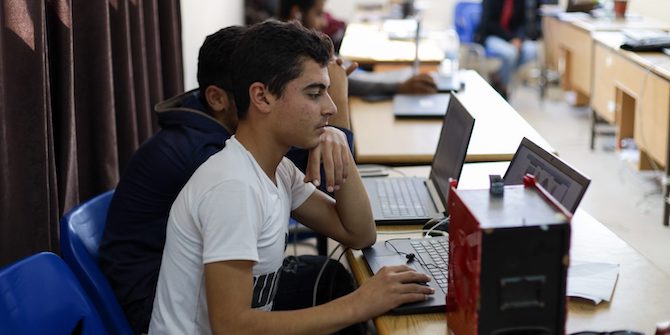by Lorraine Charles

Technical and Vocational Education and Training (TVET) is generally understood as education, training, and skills development that relates to a range of occupational fields, production, services and livelihoods. It provides the skills needed for rapid economic integration by preparing individuals for work, developing their abilities and responding to the labour market.
Despite being long neglected and marginalised in policy discussions, the importance of TVET has been more recently acknowledged as a crucial element of a state’s education system. It holds a prominent position as SDG Target 4.3 (in the UN’s Sustainable Development Goals) which explicitly emphasises the need for governments to ensure equal access to TVET.
As the labour market has become technologically focused, particularly in a post-COVID landscape with the importance of digital skills more widely recognised, the reconceptualisation of TVET to include digital skills training has become a priority.
TVET in Jordan: The Status Quo is Inadequate
In Jordan, as well as in the MENA in general, the quality of service provision in TVET is relatively low. This is due to outdated curricula that are not aligned with labour market needs, the absence of continuous professional development for instructors, and poorly equipped institutions. Moreover, the Jordanian TVET education system is poorly funded (in 2016 only 3.6 percent was spent on TVET compared to 12 percent on higher education).
According to our research, a TVET qualification is not desirable for Jordanians or Syrian refugees, who tend to prefer a university degree. Indeed, TVET qualifications are regarded as being low status and for those who did not have the aptitude to obtain a university degree. Yet, perceptions are slowly shifting, especially as increased attention is being placed on digital skills training. A survey conducted by UNDP indicated that 29 percent of the surveyed youth were interested in some form of vocational training.
Towards Digital Skills Training in TVET
The Jordanian government, recognising that digital skills are part of the future of work, has taken steps to accommodate for this new reality by including it as part of the employer-led Sector Skills Councils (SSCs) mandated with bridging the gap between training and the skills needs of the labour market. The Information and Communications Technology Association of Jordan (Int@j) has been given oversight of this sector. The aim is to build a framework to ensure that companies can have an adequate supply of talent and address the gap in the tech sector between education and the workforce in Jordan.
Digital skills training, though technically falling within the TVET classification, is not stigmatised in the same way as ‘traditional’ TVET in Jordan. There has been a massive acceleration towards digital skills in response to COVID, and many institutions and NGOs/INGOs are beginning to include digital skills training in their programming.
Remote Work: A Legal Loophole for Refugees
Jordanian labour law excludes refugees from working in the local tech sector, yet there is no explicit legislation that prevents refugees from working remotely for employers outside the country. Jordan has passed a law that allows Syrian refugees the ability to legally work from home, and this incorporates what has been termed ‘intellectual’ work. This includes consulting, research, architecture, interior design, translation and fashion design, among other pursuits. This means that digital remote work, effectively a home-based business, may well be permitted. Thus, Syrians could potentially work as freelancers and contractors. In fact, the government seems to be turning a blind eye to Syrians working remotely.
Our research found that, while the Jordanian government has been silent on the ‘loophole’ of Syrians working as freelancers and remote contractors, they may be less reluctant to overlook this type of work for Jordanians, as no tax or Social Security would be paid to the government when individuals work this way. Formal employment is tied to Social Security which is paid to the government by the employer and applies to anyone working for a Jordanian company, even on a freelance basis. However, working through freelancing platforms or for foreign companies seems to bypass this as there is no way for the government to track people working this way. The government seems to be aware of the loophole, but so far has done nothing. One interviewee predicted that as there is no way for the government to monitor and control the freelance sector, it would continue to thrive and include refugees.
A 2020 World Bank announcement of US$200 million to increase access for Jordanian youth and refugees to digital jobs and expand government digital services has allowed for a renewed perspective on refugees working remotely. According to the press release, the Youth, Technology and Jobs project will ‘generate 10,000 new income opportunities for youth in the coming five years, including women (30%) and Syrian refugees in freelance opportunities (15%).’ This announcement established a recognised pathway, though not acknowledged in Jordanian labour law, for refugees to access digital remote work.
Despite the potential of remote digital work and freelancing, challenges associated with promoting it as a viable option for refugees persist. Without legal protection for refugees around remote digital work and simplifying the process for the establishment of home-based business, refugees remain trapped in informal working arrangements. While the opportunities presented by digital remote work provide better opportunities, the precarious nature of the work and lack of social protection remains. Whether refugees possess the skills, aptitude and appetite for this work is also unknown. In fact, interviews alluded to the fact that few Syrians might actually have the required technical skills and English ability to take advantage of this opportunity.
It is important to recognise that remote digital work is not a silver bullet for jobs for refugees and it is unable to address all the problems associated with refugee employment. Yet, it can form part of a strategic approach to address unemployment among the Syrian refugee population in Jordan, providing opportunity for those who have the aptitude and skills needed for working remotely and in digital fields of work.






I know that is generally understood as education, training, and skills development Thanks for sharing